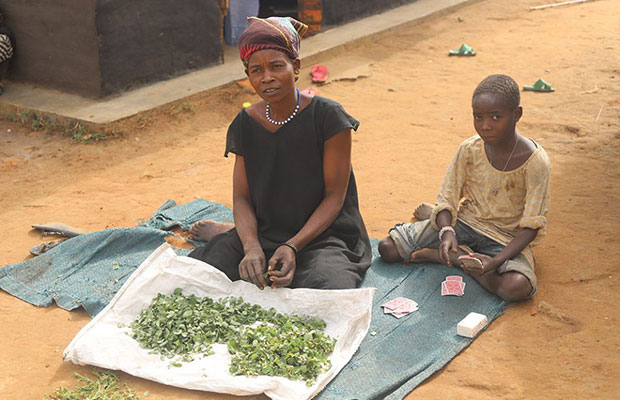
Sowing Seeds in a Garden of Hope
Photo credit: Global Sisters Report – Doreen Ajiambo
War. Loss. Displacement. Despair. At 35 years old, Mary has already endured more than her fair share of adversity. When the global pandemic effectively cut humanitarian aid to the Palabek Refugee Settlement where she lives with her children, she wasn’t sure she’d survive yet another devastating hardship.
“When we arrived, we used to receive aid from different organizations,” Mary explains in a recent article published by the Global Sisters Report, a project of the National Catholic Reporter. “But when the pandemic hit us, most of these organizations left and feeding my children became a nightmare.”
Mary had fled to Palabek from South Sudan in 2017, after rebel soldiers killed her husband and left her young family fearing for their lives. After a grueling journey to cross the border to Uganda, she and her children arrived with little else but the clothes on their backs hoping someone would help them. With no job or means to support her family, Mary faced little choice but to depend upon humanitarian support for their basic needs.
Father Lazar Arasu, who first established Don Bosco Palabek in 2017, recognized the predicament that Mary and thousands of other refugees faced. “When the pandemic hit the world, it came to us as a shock,” he explains in the article. “Everything was closed down and the refugees were left for dead.”
But thanks to the generosity of Salesian Missions donors, Fr. Lazar quickly responded. Together with Sister Lucy Akera of the Little Sisters of Mary Immaculate of Gulu, who came to Palabek at Fr. Lazar’s request, and five other Salesian missionaries, an initiative was launched to teach refugees how to plant, cultivate and harvest their own kitchen gardens.
“We realized we had to look for a long-term solution to hunger,” Sr. Lucy says, “which is farming.”
Through the program, participants like Mary receive the training, tools, seeds and fertilizer they need to grow essential crops—including beans, corn, soy, sesame, groundnuts and a variety of greens. Refugees can use land that Fr. Lazar rents from local Ugandans specifically for sustainable farming. Program participants also learn how to prepare the soil, select seeds, plant crops, manage weeds, and handle and store food safely and properly.
For her part, Mary succeeded in growing enough food not only to nourish her own family, but to share with others in need. She even has enough surplus vegetables that she has begun selling them. With the small income she now earns, she is able to purchase basic necessities for her children.
“This is just one heartwarming example of the many innovative programs our missionaries have established in Palabek since first arriving in 2017,” says Father Gus Baek, director of Salesian Missions. “Because they are the only permanent humanitarian organization within the camp, they see and hear about emerging needs almost immediately—and are poised to react in creative ways. Today, thousands of refugees—many of them women and children—are successfully working toward establishing new lives and better futures with our help, and the kind generosity of our many friends.”
In addition to the kitchen garden project, Don Bosco Palabek operates four nursery schools that serve more than 1,000 children; several primary and secondary schools that serve over 700 students; and a vocational training center that prepares youth for employment.
Our mission helps grow food, and provide hope, for desperate people around the world. What’s your mission?
Learn more about our work in Uganda.

